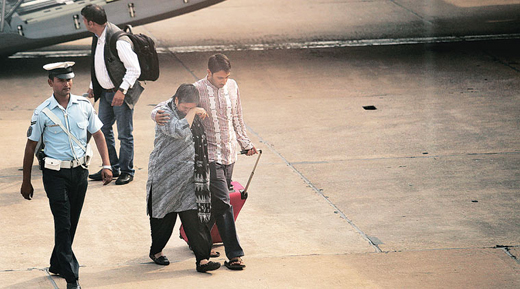Kabul attack: ‘Not how I expected Martha to return’
Mangalore Today News Network
May 16, 2015: Minutes before the Taliban attacked her guesthouse in Kabul, Martha Farrell, an NGO director and a women’s rights crusader, had told her husband over the phone that she would be back on Saturday “after spending Friday night with friends”. “She sounded satisfied with her work in Kabul,” her husband Rajesh Tandon recalled.

On Friday, as Farrell’s body was flown to Delhi by a special Indian Air Force plane, Tandon said, “This is not how I expected her to reach home.”
Martha’s body, along with the bodies of three other victims from India — two auditors and a consultant for an Afghan government project — arrived in Delhi on Friday evening. A total of 14 persons died in the attack.
Farrell and her husband had founded the President of Participatory Research in Asia (PRIA) in 1982 to promote citizens’ participation in democratic governance. As Farrell’s remains reached the PRIA office on Friday evening, colleagues, friends and family members gathered to pay their tributes.
“Long before an act on sexual harassment at the workplace was formulated, Martha put in place a sexual harassment committee in this office. In order to encourage women to file such complaints, boxes in the women’s washroom were put up so that complaints could be filed anonymously,” said Tapati Dutta, who briefly worked under Farrell at PRIA.
Condolence messages and photographs put up in the office told a story about Farrell’s life.
“Martha was a strong woman, always very focussed and determined. She was a great trainer, she was instrumental in mainstreaming gender in PRIA, and she always raised gender issues in all discourses. Martha was passionate about her work,” read a message by Sahayi – Centre for Collective Learning and Action.
Apart from her strong views on gender issues, many remembered Farrell for her humility.
An alumnus of Delhi University, she went on to finish her doctoral thesis from Jamia Millia Islamia.
During her 25-year career, Farrell was associated with national and international projects on the role of gender in education, research and policy formulation. “She also worked extensively in the field of non-formal education,” a colleague recalled.
“She had been to Kabul a few times in the past. This time, she had gone for a training programme on gender issues. She had left on May 9 and was supposed to return tomorrow,” said Nandita, who closely worked with Farrell at PRIA.
Another colleague pointed to a poster with Farrell’s image and a quote: “Men need to consider their behaviour, because what men consider natural may not be seen the same way by women. Drawing the line means being able to say ‘no’, because as women we have a choice.”
Farrell is survived by her husband and two children, Suheil and Tarika. Her last rites will be performed at the Lodhi crematorium on Saturday.
Courtesy: Indianexpress
- Tirthahalli student Deeksha scores 600/600 in II PU after revaluation, tops science stream in Karnataka
- Kudremukh trekking circuits to reopen from May 1
- Two medical students of Tiruchi SRM Medical College drown in Arabian Sea at Gokarna
- KS Hegde Hospital achieves landmark success with three complex Carinal Resection Surgeries for lung cancer
- Mangaluru: Facebook page booked for supporting Pahalgam massacre; probe underway to trace admin
- Nitte Institute of Hospitality Services: 33 years of excellence in shaping hospitality professionals
- Niddodi woman murder case: Accused acquitted
- KSRTC Conductor suspended for sexually harassing female passenger
- Udupi: Three arrested for IPL betting
- President Murmu to represent India at funeral of Pope Francis
- 37 km port connectivity road to be illuminated with street lights: MP Brijesh Chowta
- Pahalgam terror attack: BJP Mahila Morcha holds candlelight vigil in Mangaluru
- Bishop of Mangaluru Condemns Pahalgam Terror Attack
- Pakistan continues unprovoked firing along LoC; Indian Army responds
- Kashmir on high alert after intel warns of terror plots targeting non-locals, rail network
- Supreme Court pulls up Rahul Gandhi over Savarkar remark, stays HC order
- Former ISRO chief K Kasturirangan passes away in Bengaluru
- Identify all Pakistanis in India, send them back: Amit Shah to Chief Ministers
- BCCI sends tough message to Pakistan after Pahalgam terror attack: "Will not play..."
- Pak provokes India with firing across Line Of Control, retaliation follows
- Janivara row: Govt gives two options to Bidar boy
- Homes of 2 Lashkar terrorists involved in Pahalgam attack destroyed in blast
- With eyes on Pakistan, India speeds up launch of special spy satellite
- Will punish Pahalgam terrorists, planners beyond their imagination: PM Modi
- 3 Naxalites killed in encounter with security forces in Chhattisgarh
- Skills and Competencies Take Center Stage at MSN Dialogue Series
- Court remands Maoist Lakshmi to six-day police custody
- Sandhya Shenoy honored with Society for Materials Chemistry Medal-2024
- White Cornus Apartment in Mangaluru
- City girl wins first place in state-level spell bee competition
- Alleged ‘Love Jihad’ Case in Mangaluru: Woman left home voluntarily, says police
- Girl fatally struck by reckless two-wheeler near Belman
- New residential complex for the judges inaugurated in Mangaluru
- Absconding accused nabbed after 8 years
- Truck with cylinders turns turtle in Beltangady
- Bhoota Kola artist dies of cardiac arrest
- Development of the country should be our goal: Ganesh Karnik
- Container truck gets stuck under Modankap railway bridge
- Truck crushes bike’s pillion rider near BC Road
- Head constable dies of heart attack
- CITY INFORMATION
- TRAVEL
- TOURIST INFORMATION
- HEALTH CARE
- MISCELLANEOUS




 Write Comment
Write Comment E-Mail To a Friend
E-Mail To a Friend Facebook
Facebook Twitter
Twitter  Print
Print 


